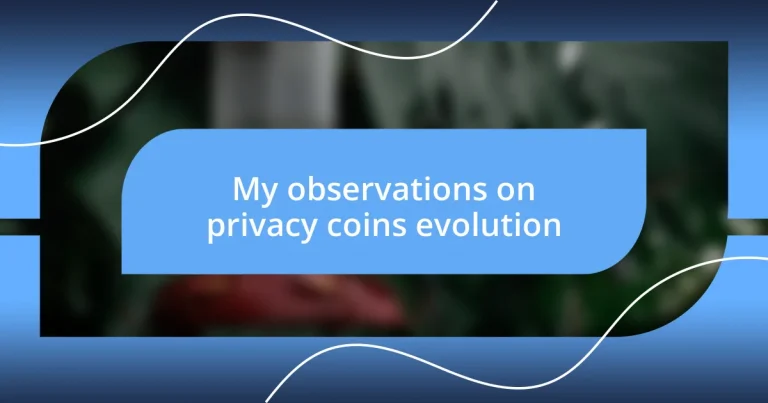Key takeaways:
- Privacy coins emerged as a response to the limitations of Bitcoin’s privacy features, with innovations like Monero and Zcash focusing on transaction anonymity through advanced cryptography.
- The main challenges for privacy coins include regulatory pressures for compliance, technological advancements in tracking, and limited acceptance in mainstream platforms.
- The future of privacy coins depends on balancing regulatory dialogue, continuous technological innovation, and increasing public education and acceptance to enhance their role in financial autonomy.
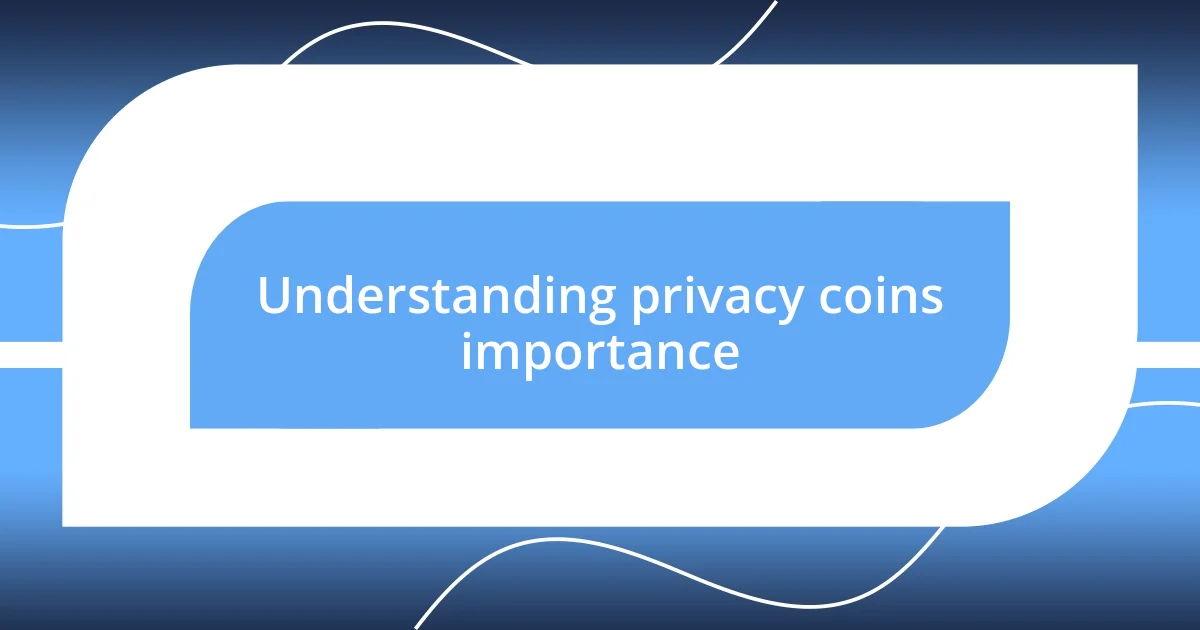
Understanding privacy coins importance
Privacy coins hold a vital place in our digital landscape, particularly as the conversation around data security intensifies. I remember when I first began exploring cryptocurrency; the sheer idea that financial transactions could be entirely private was a revelation. Don’t you find it unsettling to think how much of our financial information can be exposed?
What strikes me about privacy coins is their ability to empower individuals. With the rise of government surveillance and data breaches, these coins offer an option for those who value their confidentiality. I often think about how I would feel knowing that my spending habits were open for scrutiny—it’s pretty invasive, right?
Moreover, the increasing use of privacy-centric cryptocurrencies can challenge the status quo of financial transactions. It makes me hopeful to see platforms focusing on user autonomy. Isn’t it refreshing to consider a future where we have more control over our own financial narratives?
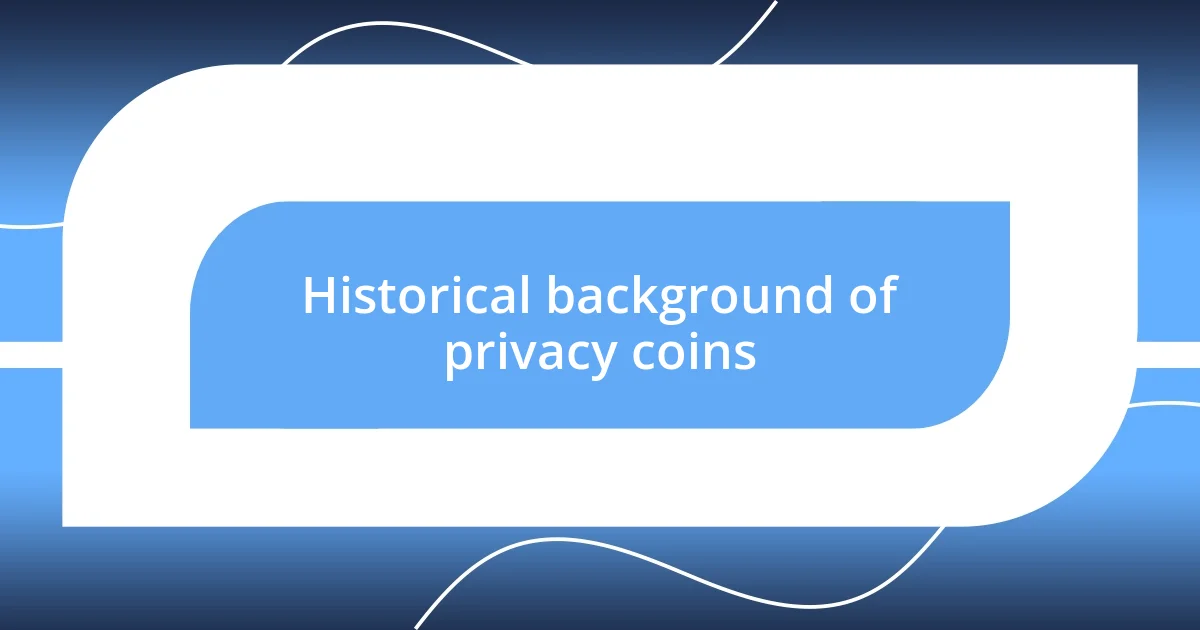
Historical background of privacy coins
The journey of privacy coins began with the emergence of Bitcoin in 2009, which, despite its decentralized nature, offered limited privacy features. I recall the early days when discussions about transaction tracing and the potential for exposing users’ identities became hot topics in crypto forums. This realization sparked a wave of innovation aimed at enhancing privacy, leading to the development of specialized coins that prioritize user anonymity.
- In 2014, Monero emerged, employing advanced cryptographic techniques like ring signatures and stealth addresses to obscure sender, receiver, and transaction amounts.
- Dash, originally forked from Bitcoin, introduced PrivateSend, allowing users to mix coins and enhance transaction confidentiality.
- Zcash, launched in 2016, offered a revolutionary option for privacy with its zk-SNARKs technology, enabling shielded transactions.
- Other projects, like Pirate Chain, took anonymity even further by using a privacy-centric approach that requires all transactions to be shielded.
As I explored these projects, the diversity in privacy solutions amazed me. Each coin not only served a distinct purpose but also showcased the growing demand for financial discretion amid increasing scrutiny of our digital footprints.
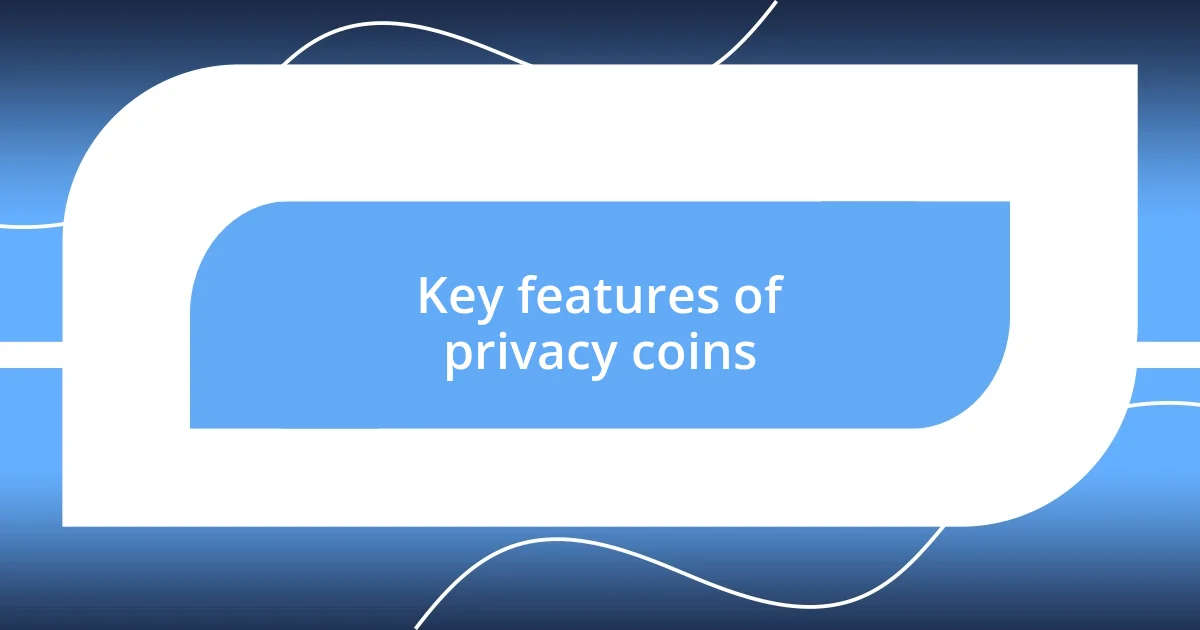
Key features of privacy coins
Privacy coins come equipped with several key features that distinguish them from their more public counterparts. One standout feature is the use of advanced cryptography, which I find fascinating. For instance, Monero’s ring signatures and stealth addresses effectively conceal the identities of transaction participants. It reminds me of when I first learned about encryption—it felt like stepping into a world where my digital presence could be hidden from prying eyes. Isn’t it empowering to think that there’s a way to maintain such anonymity in financial transactions?
Another significant feature is the concept of fungibility, which is surprisingly crucial yet often overlooked. For example, Zcash’s shielded transactions mean that every coin is interchangeable and indistinguishable from another, enhancing its value as a currency. It resonates with me deeply when I consider how traditional money can carry a tainted history; you wouldn’t want to unknowingly use “dirty” cash, right? With privacy coins, this concern is effectively mitigated, making a stronger case for their usage in everyday transactions.
Lastly, the decentralized nature of privacy coins is a cornerstone of their appeal, fostering not just security but also a sense of community. I remember connecting with other enthusiasts in online forums, discussing how these coins can democratize financial systems. It’s heartening to imagine a world where individuals can conduct transactions without surveillance, giving rise to true peer-to-peer finance. Doesn’t that sound like an exciting future, filled with possibilities?
| Feature | Description |
|---|---|
| Cryptography | Uses techniques like ring signatures and stealth addresses to obscure identity and amounts. |
| Fungibility | Ensures every unit of currency is interchangeable and cannot be differentiated from one another. |
| Decentralization | Empowers users by eliminating centralized control, promoting community autonomy. |
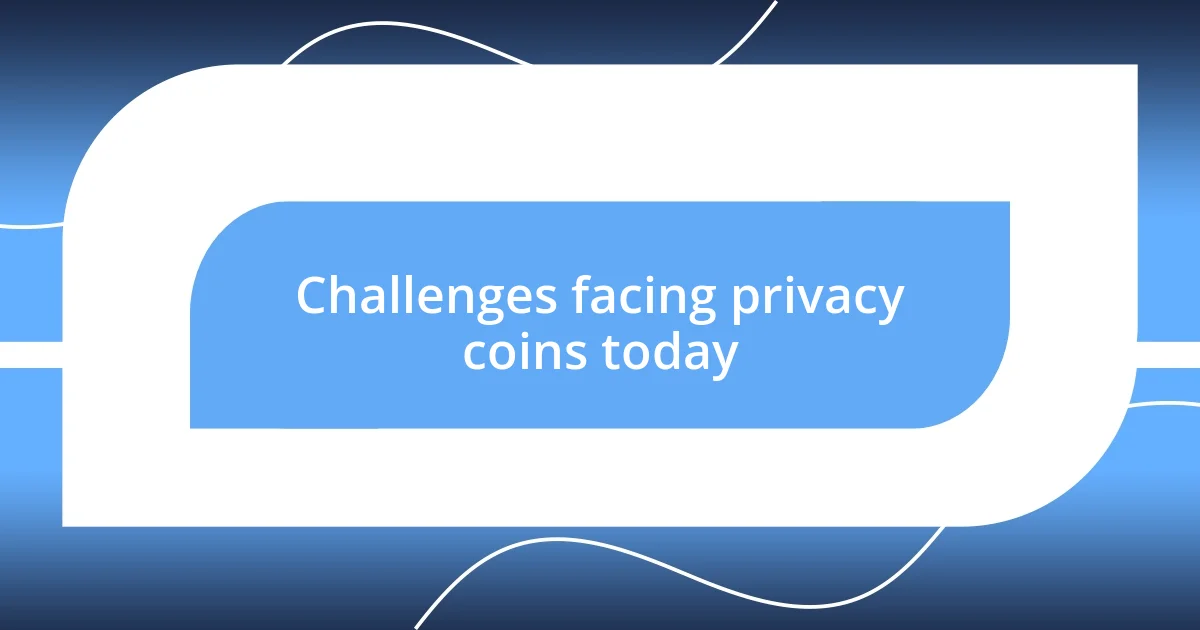
Challenges facing privacy coins today
The challenges facing privacy coins today are multifaceted and often emerge from the struggle between anonymity and regulatory scrutiny. For instance, the rising concern among governments regarding money laundering and terrorist financing has led to increased pressure for cryptocurrencies to comply with Know Your Customer (KYC) regulations. I remember a discussion I had with a fellow crypto enthusiast who felt torn; while he values privacy, he’s also wary of how these regulations might push projects to sacrifice their core principles.
Another pressing challenge is the technological arms race that privacy coins find themselves in. With law enforcement agencies developing more sophisticated tracking tools, privacy coins must continuously evolve to stay one step ahead. It’s like trying to outrun a shadow—no matter how fast you are, it feels like an endless battle. I often wonder, is it even possible to maintain true anonymity in a world where technology advances so rapidly?
Lastly, there’s the issue of acceptance and usability. Mainstream platforms and exchanges often shy away from listing privacy coins due to regulatory concerns, limiting their accessibility. This makes me reflect on those moments when I tried to explain the benefits of privacy coins to friends who are new to cryptocurrency; their hesitation often stems from the perceived risks and uncertainties. It’s frustrating, as I believe these coins offer invaluable privacy benefits, but how do we bridge that gap in understanding?
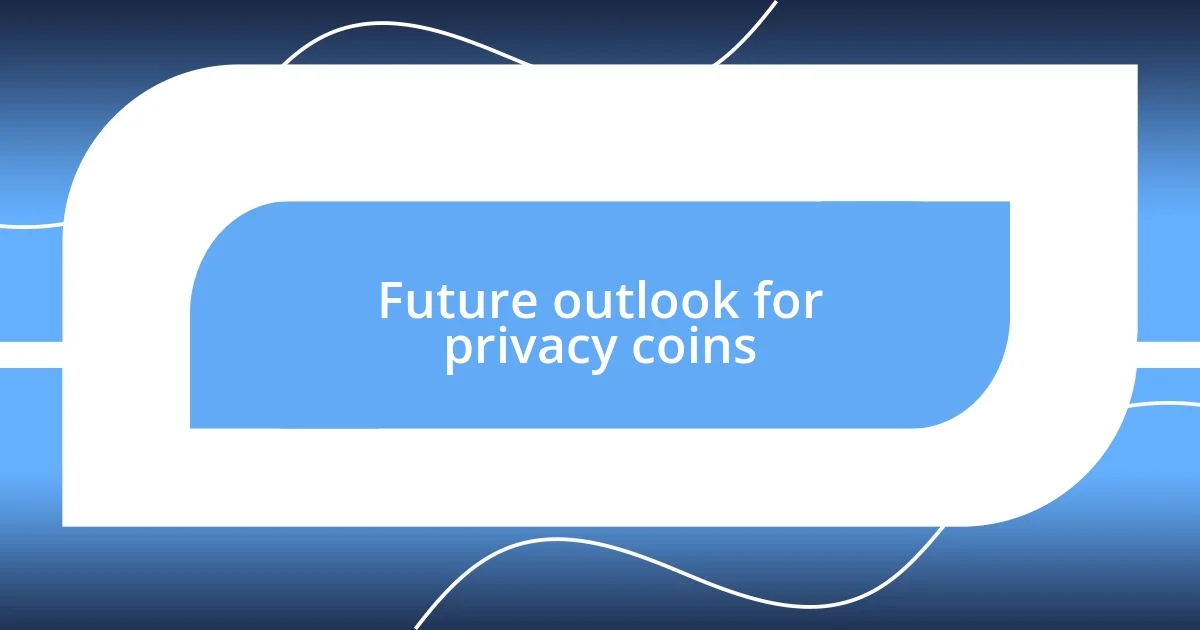
Future outlook for privacy coins
The future of privacy coins appears to be a fascinating yet challenging landscape. As I scan the horizon, I can’t help but think that their evolution will hinge on how effectively they can adapt to regulatory pressures. I remember a moment when a friend asked me about potential future developments, and I realized that engaging policymakers in dialogue could be key. Could fostering understanding lead to a more balanced approach where privacy is respected without compromising security?
Moreover, technological innovations within the privacy coins space are likely to keep evolving at a breakneck pace. As someone who has followed the trends since the early days of cryptocurrency, I feel both excitement and apprehension. Continued advancements might offer solutions to the concerns around tracking and surveillance. Will these innovations make privacy coins even more secure, or will they simply trigger a new wave of regulatory scrutiny? It’s a question that continues to echo in my mind.
On the other hand, increasing acceptance among mainstream users could transform the narrative around privacy coins. I often recall my own excitement when I introduced a privacy coin to a skeptical family member. Their eyes lit up as they understood the benefits, which made me wonder—what if more people had access to education around these coins? If privacy coins can become as accessible as Bitcoin, could we witness a paradigm shift in how individuals think about sovereignty and financial autonomy?











